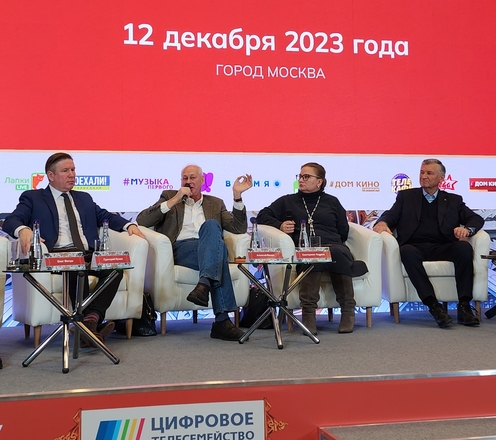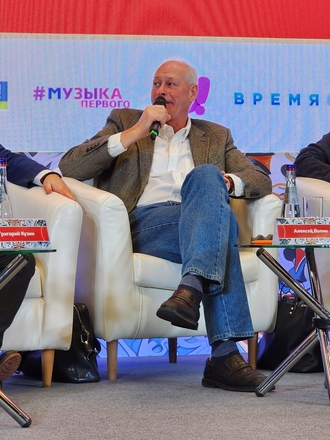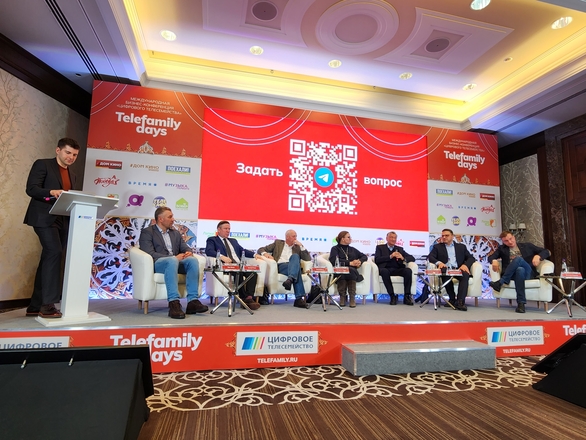Satellite or Earth? – Both: RSCC Director General Alexey Volin spoke about diversity in TV broadcasting at the Telefamily Days conference
Combining the satellite and cable advantages is the best approach to providing consumers with uninterrupted television services. That was the opinion voiced by Alexey Volin, Director General of Russian Satellite Communications Company, Chairman of the specialized ICC, during the round table “Satellite or Earth?” held on Tuesday in Moscow as part of the “Telefamily Days international business conference.
Satellite is currently one of the most reliable methods of delivering TV content to subscribers. 80% of the Russian territory still have no alternative: none of the regions in the country can now abandon using space communications and switch to optical fibre alone. “The satellite is required, among other things, to provide services to settlements not covered by digital free-to-air television. And it is not about hard-to-reach areas only. Today, all four major satellite TV operators – MTS, NTV, Tricolor, Orion-Express – use the RSCC infrastructure to provide their services. The domestic constellation made it possible to maintain TV broadcasting when, due to the international situation and sanctions, foreign partners disconnected our operators from their resources,” said Alexey Volin.
In general, the demand for satellite services has been growing steadily, as part of a global trend, as the Director General of Russian Satellite Communications Company believes. “It is often said that abroad the share of television content among satellite operators has been falling. In fact, there are multidirectional trends. For example, in the UK, France, Germany, Japan, the share of satellite content has indeed been falling, while in other markets – Asia, Africa, Latin America, Russia, the CIS – it still remains high. We have even been witnessing a potential for growth, in particular, because more and more HD channels enter the market. And exactly due to ‘heavier’ content, the television segment will for a long time make up about 50 or even more percent,” emphasized Alexey Volin.
Space communications also have advantages in counteracting interference. It is not an easy task to hack a spacecraft due to a small number of points of impact. “And the Internet, being a huge network, has always room for vulnerability. While the number of spacecraft is limited,” stated the Director General of RSCC. According to him, since the beginning of 2023, RSCC has repelled about 35 thousand attempts to interrupt TV broadcasting on Russian spacecraft. It strives to prevent interference every day.
As for security, in addition to hacking, there are technical problems to which space communications are also less susceptible than optical fibre, which always has the risk of damage – due to accidental human error or natural disasters. “For example, forest fires: they often lead to the burning of substations or cables, there may be interruptions in the power supply, etc. If we are talking about broadcasting abroad, among other things, the satellite, of course, provides complete independence from ground infrastructure and protection from external interference attempts. Therefore, a combined, mixed option is the best solution and, in general, the development strategy of Russian TV broadcasting has always been built on the interaction of all forms of distribution,” noted Alexey Volin.
The round table was also attended by Ekaterina Larina, Director of the Department for the Development of Mass Communications and International Cooperation of the Ministry of Digital Development of the Russian Federation, Kirill Makhnovsky, Director General of Orion Express LLC, Vyacheslav Mironov, Director General of RTP LLC, Oleg Fatun, Deputy Director General of Synterra Media JSC, Nikolay Lukyantsev, Director General of GeoTelecommunications LLC, Konstantin Ankilov, Director General of TMT Consulting Agency, and Grigory Kuzin, Director of the Medialogistics project of MSK-IX JSC. The event was organized by “Channel One. Worldwide Network”.


